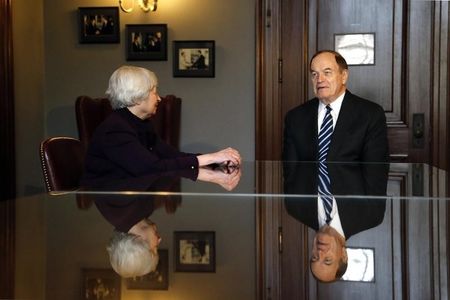By Emily Stephenson
WASHINGTON (Reuters) - Richard Shelby appears poised to retake his old job as head of the Senate Banking Committee after big Republican electoral wins, likely bringing tougher scrutiny of the Federal Reserve, big banks and housing finance giants Fannie Mae and Freddie Mac.
But his ability to drastically revamp financial regulation or eliminate the two government-controlled mortgage companies would be limited with Washington still closely divided even after the elections handed control of the Senate to the Republicans.
Shelby, an Alabama Republican who objected to great swaths of the Dodd-Frank Wall Street reforms approved in 2010, will have to walk a fine line between the House of Representatives, where Republican leaders want to repeal large parts of the law, and President Barack Obama, who would veto any attempt to gut it.
With party rules that would restrict Shelby to just two more years at the helm of the panel, analysts and former aides say they expect him to focus on areas where he could attract some Democratic support. That could mean tougher oversight of the Fed's regulatory powers and more of an effort to pressure big banks to boost capital.
"It comes down to what's achievable," said Lendell Porterfield, a former Shelby aide who is now with the lobbying firm Porterfield, Lowenthal, Fettig & Sears.
A spokeswoman for Shelby declined to elaborate on his plans.
MANAGING EXPECTATIONS
Even before the elections, lobbyists had told clients not to expect a major overhaul of Wall Street regulation. Lawmakers might try to reduce the burden on smaller, regional banks, but gridlock likely would prevent more substantial changes.
Shelby and Senate Democrats are united in their criticism of the biggest banks and their regulators, which are seen as too cozy with the firms, and Shelby has at times called global capital agreements too weak.
But his approach differs from Democrats' in other ways.
Shelby has critiqued the Fed's easy-money policies, and he lent some support to attempts to audit the central bank's monetary policy decisions, a step that top Fed officials have warned would undermine the central bank's independence.
"The Fed is going to have to get used to a frostier reception," said Mark Calabria, a former Shelby staffer now at the Cato Institute, a libertarian think tank.
Housing finance reform, which failed this year when Republicans and Democrats could not agree on the government's role in a new system, would be a tough sell as well in the new Congress, political analysts said.
Liberals said a bipartisan Senate proposal that would have boosted the private sector's role in funding new mortgages would hurt borrowers. Shelby said it maintained too much of a government role in the sector.
"That is such a difficult area to get change in because there are so many people who want to have the government subsidizing that market," said Hester Peirce, a former Shelby aide who works at the Mercatus Center, a right-leaning think tank at George Mason University in Virginia.
In contrast, some lobbyists believe Shelby might be able to win changes to the new Consumer Financial Protection Bureau, which was created after the Dodd-Frank law to oversee mortgages, credit cards and other financial products.

Republicans argue the bureau is unaccountable to Congress, while Democrats say its independence is necessary to protect consumers. Lobbyists said small changes, such as guidelines for how the bureau can use monetary penalties obtained through enforcement actions, might be possible.
(Reporting by Emily Stephenson; Additional reporting by Jason Lange and Michael Flaherty; Editing by Tim Ahmann and Leslie Adler)
